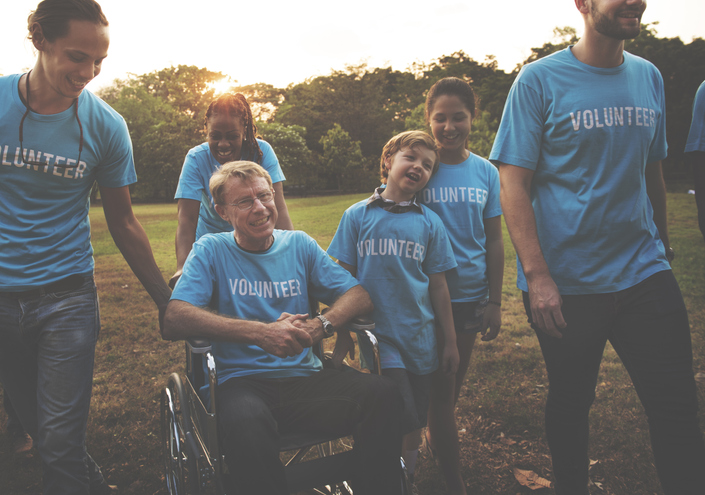I don’t remember the date, but I remember the conversation. It was the first time I’d heard the word “competition” in relation to volunteer organizations. I was in a community meeting, and nonprofit experts were discussing the impact of a newly formed nonprofit in the area.
“They’ll be looking for the same resources,” one expert said.
“Yes, we now have competition,” another added.
Huh, competition. That’s one way to look at it. But here’s the kicker statement from the CEO of one of the established titan organizations. It’s a statement that stuck with me:
“I wouldn’t worry too much, because we’ve been in this community for years and the public knows us and knows we care.”
I might add that the start-up organization did very well.
Do established nonprofits have a monopoly on compassion? Or on knowledge on how to solve societal challenges? I have always suspected that the underlying reason volunteers are not fully integrated is because they are seen as outsiders. By that I mean there are nonprofits clutching to caring and knowledge as if volunteers or donors are cat burglars sneaking in to steal it away.
I have always suspected that this is the reason volunteers are not requested by senior management nor included in planning. You know what I’m talking about, right? You introduce a highly accomplished volunteer to senior management, and you get that look. That subtle grind of the jaw that says, “Who is this interloper and what will they discover or take from me or change?”
I remember being so excited about a volunteer Serena. She was taking a year off work and staying in town with her mom. She came from a prestigious marketing firm in New York, and I couldn’t wait to get her started helping our marketing team as a volunteer consultant.
But they didn’t engage her. They didn’t even grab a cup of coffee and sit down with her to explore the treasure trove of experience she was willing to share. They simply sniffed and said there wasn’t that much for her to do. They clung to their area of expertise like it was a chest of gold and marauding pirates were landing.
I’ve heard nonprofit staff disparage corporate volunteers, dismissing them as “not understanding what we do.” But, you know what? Some of these corporate volunteers exhibited more compassion on their one day of volunteering than some staff members showed all month.
Society is rapidly evolving. What used to be exclusively in the realm of the nonprofit or even faith-based sectors is now front and center. Corporations are practicing “conscious capitalism.” Individuals are creating foundations to tackle societal challenges (Bill Gates is a prime example). Citizen helpers are bypassing volunteer organizations.
This is a quote from an eye-opening article posted by Cureo on a philanthropic Millionaire's rant:
"They never ask me to help in ways that don't involve a check? I know, I'm not going to volunteer at their race, but I'm sure there are other opportunities for me to help!
"And believe me, I have offered a number of times. I've asked for more frequent, and more relevant data. Maybe I can make new connections. Maybe I can assemble a volunteer team of some of my super talented staff to riff on a problem or deliver a solution of some kind — in areas of marketing, HR, capital projects, operational expansion — whatever!"
What are we so afraid of? That we'll lose control? That we might not be as smart as our corporate counterparts? That we'll admit we need help in planning and executing, not just in stuffing envelopes? That we'll actually put our mission ahead of our own personal need to be the most compassionate person in the room?
Now, don't get me wrong. I've had these feelings too. I remember sitting in a peer group meeting and listening to another volunteer manager talk about a successful volunteer initiative, and I felt jealous. Not inspired, not happy that people were being served. How selfishly insecure of me. I remember mentoring a new volunteer coordinator and feeling that twinge. "What if volunteers like him better than and then, *gasp,* I won't be the most loved volunteer ever to roam the earth!" (I still have that fantasy picture in my head — yeah, I know, seek help.)
You've likely heard the term Founder's Syndrome. It generally means a nonprofit founder keeps their organization from growing by clinging to power. But we don't have to be founders to suffer from treating our work like it's our baby and we are the only one who can sing it to sleep.
Maybe we proudly wear the shiny sweat on our foreheads from having labored for so long at being selfless that we can't imagine some giggly newcomer bouncing in and outperforming us. Maybe we cling to a martyr notion that caring people work for nonprofits while the rest of the selfish world drowns baby animals for money. Maybe we suffer from "Nonprofit Insulation Syndrome."
But these insulating emotions keep us from learning something new, from moving forward, from expanding and from finding better ways to help the people we profess to support. And sadly, we become the kid in the sandbox who won't let the other kids try the best toy truck. A very wise volunteer scolded me one day, arguing that my self-esteem had nothing to do with anything else but me. (I fired him on the spot — just kidding!)
That's when I began to detach myself from other people's talents and discovered what my job was really about. Was a volunteer more compassionate than me? Heck yeah! Did another volunteer coordinator create a much better program than me? Good grief, yes. Was there any place for clinging to a warped sense of my own need to be perfect? No. (I'm still roaming the earth, though.)
We should actually be excited that more people want to get involved. We should be opening doors for them, eager to share the joy we clutch. But what I fear is, the nonprofits who rest on their laurels and continue to close their doors to all this amazing outside help will be left behind.
I fear that cornering the market on compassion or empathy or knowledge will cause generous donors like the one quoted above, skilled volunteers and philanthropic businesses to give up or find another way. I fear they will leave us behind, raising our fists to the skies and bemoaning the unfairness of it all.
But then again, maybe that's what needs to happen.
Guest post by Meridian Swift. This post originally appeared on Volunteer Plain Talk.




